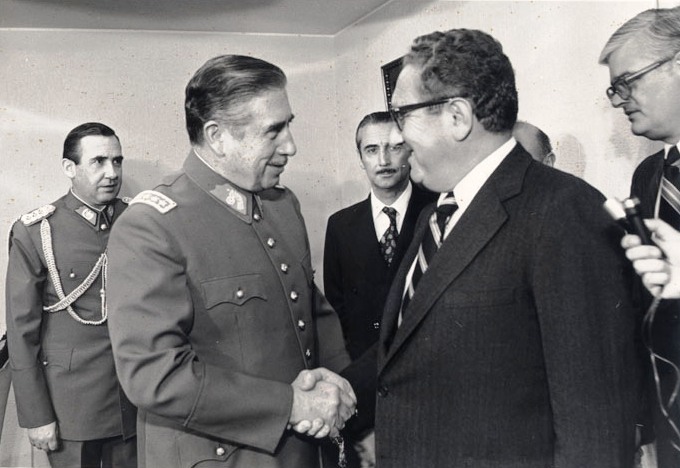Tom Lehrer, comedian and humorist said it all: “Satire died when Kissinger won the Nobel Peace Prize”. Once called “the most controversial to date”, the decision to award the Nobel Peace Prize to Henry Kissinger in 1973 was fraught with debate.
We knew already his involvement as US Secretary of State in Operation Condor in Latin America, which amongst other things orchestrated “The Other 9/11”, the military coup by Pinochet in Chile that killed the elected President Salvador Allende and was followed by a reign of terror, as well as the U.S. bombing campaigns in Cambodia.
Recently declassified documents show he also encouraged the mass killings carried out by the Argentina’s military during the 1976-83 dictatorship.
According to a report by The Guardian, he “congratulated the country’s military leaders for “wiping out” terrorism, according to a large trove of newly declassified state department files. The documents, which were released on Monday night, show how Kissinger’s close relationship to Argentina’s military rulers hindered Jimmy Carter’s carrot-and-stick attempts to influence the regime during his 1977-81 presidency. Carter officials were infuriated by Kissinger’s attendance at the 1978 World Cup in Argentina as the personal guest of dictator Jorge Videla, the general who oversaw the forced disappearance of up to 30,000 opponents of the military regime… Kissinger even held a private meeting with Videla without the presence of the US ambassador to Buenos Aires, Raúl Castro, at which human rights and Carter’s foreign policy were discussed. “Videla prearranged it so Kissinger and the interpreter would meet with him privately half an hour before ambassador’s arrival,” one cable shows.”
According to Common Dreams “During a private meeting with the conservative diplomat group Argentinian Council of International Relations (CARI), Kissinger said that “in his opinion the government of Argentina had done an outstanding job in wiping out terrorist forces.” U.S. ambassador to Buenos Aires, Raúl Castro warned that Kissinger’s praise for the military dictatorship “may have gone to some considerable extent to his hosts’ heads.”
“There is some danger that Argentines may use Kissinger’s laudatory statements as justification for hardening their human rights stance,” Castro said. “Elsewhere in the documents—released on President Barack Obama’s order in a gesture of goodwill toward Argentina—U.S. diplomats and officials can be seen wondering whether their foreign policies had gotten out of control. The National Security Council’s Latin America director, Robert Pastor, wrote in a dispatch to then-President Jimmy Carter’s national security adviser Zbigniew Brzezinski, “Have we gone too far? Have we pushed our policy beyond its effectiveness? Are we pushing the Argentines over the edge and jeopardizing our future relationship? Does the terror justify the repression?” “I, myself, believe that we may have…pushed too far,” Pastor wrote.”
Amongst the horrors of the present US electoral campaigns perhaps the fact that both Trump and Clinton have approached Kissinger “the senior statesman” does not give any reassurance that US Foreign Policy is about to change for the better.










